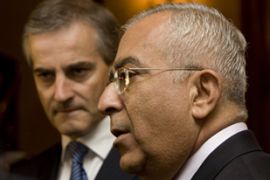Palestinian PM plans for statehood
Fayyad hopes building new infrastructure and institution will force Israel’s hand.

The objectives set out in the plan are aimed to be implemented over the next two years and would effectively create a de facto functioning Palestinian state, with or without the co-operation of Israel.
‘Pro-active’
Al Jazeera’s Nour Odeh, reporting from Ramallah, said: “What he is trying to do, according to his close aides, is first of all show that the Palestinians are pro-active … that they are working to be ready for sovereignty.
| Planning for Peace | ||||
|
|
“And at the same time send a very clear message to all those that have said that the Palestinians have done enough to prepare themselves to govern, to fulfil their security obligations and so on.”
The Palestinians want an independent state on all the territories occupied by Israel during the 1967 Middle East war, with East Jerusalem as its capital.
But Binyamin Netanyahu, the Israeli prime minister, who is currently visiting the UK, has refused to commit to beginning negotiations on a two-state solution.
Talks between the two sides have been stalled since Israel launched a 22-day offensive in the Gaza Strip last December, which killed at least 1,400 Palestinians.
Nir Hefetz, Netanyahu’s spokesman, said on Monday that a “political process” is “due to begin in about two months’ time”.
However, Mahmoud Abbas, the Palestinian president, has said any resumption of talks must be accompanied by a pledge to halt settlement activity in the occupied West Bank.
The US has been pushing for a freeze on settlement activity, but so far Netanyahu has refused to commit and officials said that there was “no breakthrough” expected when the Israeli prime minister met Gordon Brown, his British counterpart, on Tuesday.
Foreign investment
The Palestinian plan speaks of building infrastructure, securing energy sources and water, as well as improving housing, education, and agriculture.
|
“Without addressing the issue of border closures and internal closures we cannot talk about a relief of Palestinian living conditions or changing the Palestinian economy” Naser Abdel Karim, |
It also states that the size of the government should be trimmed and the legal system, which is crrently a mix of British, Jordanian, Israeli and Ottoman laws, be unified.
The document contains few details of how the objectives will be achieved, but it does suggest that tax breaks will be offered for the foreign investment that would be desperately needed to get the plan off the ground.
“The government will work on encouraging investment in Palestine through offering tax cuts to local and foreign investors [and] will review investment regulations and remove obstacles that hinder investment,” the Reuters news agency quoted the document as saying.
“Our national duty stipulates that we should do whatever we can to get our economy out of the cycle of dependency and alienation.”
‘No public trust’
Gazi Hamad, a senior Hamas official, told Al Jazeera that talk of Palestinian statehood should not come before other issues.
“We need national consensus and national meetings of all Palestinian factions in order to put a new political strategy, a new political vision, in order to understand how to manage, how to run the conflict with the occupation.
“But if they just talk about peace, about negation … people don’t trust it.”
Concerning the role of the Obama administration, he said: “Till now we have not seen any practical steps … [Israel] are still building settlements … We need a decision from the American administration that they tell Israel a very clear message that you have to stop building settlements, you have to declare that the occupation must be over, you have to recognise the Palestinian nation. This is what we need.
“But all the time they tell the Palestinian ‘We support you, we support the two state solution, we support building a Palestinian state. But on the ground nothing.
“We have spent more than 20 years hearing the same language, the same voices, the same words.”
Naser Abdel Karim, an economist at Ramallah’s Bir Zeit University, told Al Jazeera that the document was “very ambitious”, but would ultimately struggle to improve the situation while Israeli restrictions remained on the Palestinian territories.
“Without addressing the issue of border closures and internal closures we cannot talk about a relief of Palestinian living conditions or changing the Palestinian economy,” he said.
“The framework of Mr Fayyad has laid out exactly the right way. We need to end the occupation, but first we need to build a state, then end the occupation, then the Palestinian economy can prosper.”

 Video: The settlements issue
Video: The settlements issue